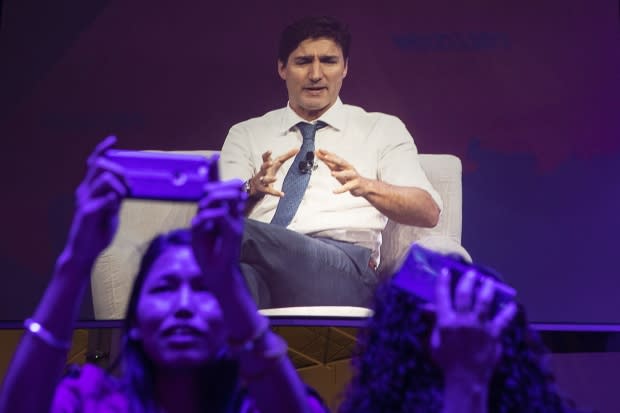Parties will be 'caught flat-footed' if they don't come up with ways to fight disinformation on campaign trail

Canada's political parties are making a mistake if they don't have a strategy in place for tackling fake news online, according to an expert in combating political disinformation. But when contacted by CBC News, none of the parties offered clear evidence that they do.
"All campaigns have a high likelihood of being targeted," said Lisa Kaplan, a former digital director for a U.S. Senate campaign and the founder of Alethea Group, which provides strategies for campaigns and organizations to fight disinformation. "The last thing they want is to be caught flat-footed."
At a hearing in Ottawa Tuesday, a Facebook representative said that false or misleading videos of Canadian politicians would not be removed from the popular social media platform if they surface during the election campaign — unless those videos violate the site's community standards.
CBC News reached out to representatives of the Conservative, Liberal and NDP parties to inquire about how they're preparing to mitigate inaccurate media online, since they can't lean on the platforms.
A spokesperson for the Liberal Party cited the government's new Elections Modernization Act, or Bill C-76, which includes new provisions over misleading publications — but only if those publications are impersonating someone.
That is something that Facebook already agreed is a violation of its standards. Fake or manipulated videos are not covered under the act.

"We are also providing 2019 candidates, campaign teams and campaign officials with comprehensive resources and guides on best practices for cybersecurity and awareness on social media, on email and the web," said Braeden Caley, the party's senior director of communications.
Caley did not respond to a request for access to these resource materials.
'This is a largely unregulated space'
The NDP and Conservative parties, meanwhile, mostly criticized the governing Liberals for not doing enough to regulate social media platforms.
"Conservatives have repeatedly asked the government to clearly outline how they plan to monitor cyberthreats and regulate social media platforms to prevent foreign influence, while respecting Canadians' fundamental right of free speech," said Cory Hann, director of communications for the Conservative Party of Canada. "Justin Trudeau cannot be trusted to police 'disinformation' on the internet."
Melissa Bruno, national director for the NDP, said the party had "put together a training guide so everyone involved in our campaign knows how to report false content or hate speech and can do so quickly and effectively."
But simply reporting disinformation — and hoping that social media platforms take it down — doesn't go far enough for an effective strategy, Kaplan said.
"What campaigns need to realize is this is a largely unregulated space, so platforms are writing the rules and arbitrating them themselves," she said. "They should have a strategy and be asking questions like: 'Who would we call if this happened? How would we respond? What sort of information would we need to make a decision?'"
Kaplan suggested, for example, that campaigns film all appearances of a candidate, so that if an altered video emerges, they have the original to offer for comparison.

The topic of misleading videos was a sticking point at Tuesday's hearing, which was part of a Canadian meeting of the international grand committee on big data, privacy and democracy, an assembly of representatives from 11 countries formed shortly after the Cambridge Analytica scandal.
In particular, many MPs criticized Facebook's decision to not remove a manipulated video of U.S. House Speaker Nancy Pelosi that went viral last week, and asked whether similar videos of Canadian politicians would be removed.
"If that were to happen in the Canadian election — a similar video of a Canadian politician, perhaps the leader of one or another of the parties, were to be posted and manipulated in the same way to give the impression of mental incapacity or intoxication — would Facebook remove that video?" Conservative MP Peter Kent asked.
Kevin Chan, Facebook's head of public policy in Canada, responded that content is only taken down if it violates the site's community standards, such as if it were posted by an account impersonating someone.
But Facebook does not have a policy that stipulates the content posted on its site must be true. The company has agreed to take down accounts that show signs of "co-ordinated inauthentic behaviour," and work with the government to combat false information, but it has made no promises to remove content similar to the Pelosi video, should it surface in Canada.
Working with platforms and existing regulations can be part of a campaign strategy, Kaplan said, but parties need to go further if they want to effectively combat disinformation.
"We know what's happening and we've seen this play out before," she said. "Campaigns really need to be prepared."


